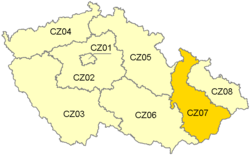Central Moravia
Appearance
(Redirected from Střední Morava)
Střední Morava | |
|---|---|
NUTS2 Region | |
 | |
| Country | |
| Area | |
| • Total | 9,231 km2 (3,564 sq mi) |
| Population (2024-01-01)[1] | |
| • Total | 1,213,608 |
| • Density | 130/km2 (340/sq mi) |
| Time zone | UTC+1 (CET) |
| • Summer (DST) | UTC+2 (CEST) |
| HDI (2021) | 0.874[2] very high · 4th |
Central Moravia (Czech: Střední Morava) is an area of the Czech Republic defined by the Republic's Nomenclature of Territorial Units for Statistics, level NUTS 2. It is formed by the Olomouc Region and Zlín Region. It covers an area of 9 231 km2 and 1,213,608 inhabitants (population density 131 inhabitants/km2).
| Year | Pop. | ±% |
|---|---|---|
| 1869 | 855,145 | — |
| 1880 | 924,658 | +8.1% |
| 1890 | 964,721 | +4.3% |
| 1900 | 1,011,286 | +4.8% |
| 1910 | 1,068,512 | +5.7% |
| 1921 | 1,065,833 | −0.3% |
| 1930 | 1,134,619 | +6.5% |
| 1950 | 1,043,689 | −8.0% |
| 1961 | 1,133,101 | +8.6% |
| 1970 | 1,165,835 | +2.9% |
| 1980 | 1,239,737 | +6.3% |
| 1991 | 1,244,244 | +0.4% |
| 2001 | 1,238,833 | −0.4% |
| 2011 | 1,208,372 | −2.5% |
| 2021 | 1,184,119 | −2.0% |
| Source: Censuses[3][4] | ||
Economy
[edit]The Gross domestic product (GDP) of the region was 19.3 billion € in 2018, accounting for 9.3% of Czech economic output. GDP per capita adjusted for purchasing power was 22,400 € or 74% of the EU27 average in the same year. The GDP per employee was 70% of the EU average.[5]
See also
[edit]49°30′0″N 17°30′0″E / 49.50000°N 17.50000°E
References
[edit]- ^ "Population of cohesion regions, regions and districts of the Czech Republic, 1 January 2024". Czech Statistical Office. Retrieved 2024-05-17.
- ^ "Sub-national HDI - Area Database - Global Data Lab". hdi.globaldatalab.org. Retrieved 2024-05-17.
- ^ "Historický lexikon obcí České republiky 1869–2011" (in Czech). Czech Statistical Office. 2015-12-21.
- ^ "Population Census 2021: Population by sex". Public Database. Czech Statistical Office. 2021-03-27.
- ^ "Regional GDP per capita ranged from 30% to 263% of the EU average in 2018". Eurostat. Archived from the original on 2020-04-17.
